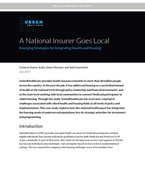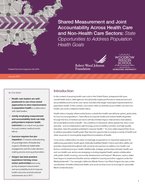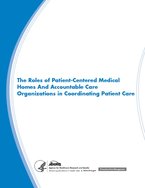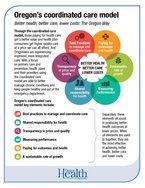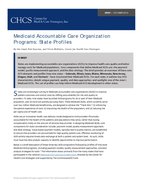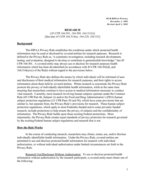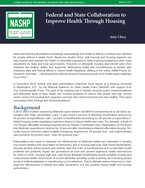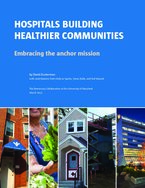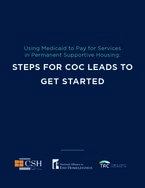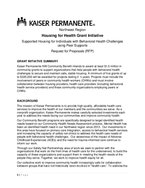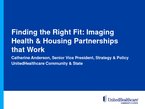0
Policy Brief
Community:
Oct 29, 2018
In this Focus on Unaccompanied Youth brief, we review data and information that help us answer the following
questions:
• What is the scale of youth homelessness?
• What do we know about unaccompanied youth who experience homelessness?
• What do we know about patterns of homelessness among unaccompanied youth?
• What do we know about youths’ risks for experiencing homelessness?
• What are the most significant gaps in available data and our current understanding of unaccompanied
youth who experience homelessness?
Authored by: U.S. Interagency Council on Homelessness
Topics: Data sharing, Homelessness, Housing, Low-income, Metrics, Research, Youth
 Shared by Mica O'Brien
Shared by Mica O'Brien
Mica O'Brien posted a
on Nov 1, 2018
U.S. Interagency Council on Homelessness
In this Focus on Unaccompanied Youth brief, we review data and information that help us answer the following
questions:
• What is the scale of youth homelessness?
• What do we know about unaccompanied youth who experience homelessness?
• What do we know about patterns of homelessness among unacc
0
Report
Community:
Oct 24, 2018
CLPHA’s Housing Is Initiative is engaged in a number of cross-sector activities focused on developing partnerships, facilitating a community of practice, resource development, promoting best practices, online collaboration, policy and advocacy, and training and education. Read about recent activities in this Fall Update.
Authored by:
Topics: Child welfare, CLPHA, Community development, Cost effectiveness, Data sharing, Early childhood, Education, Family engagement, Funding, Health, Homelessness, Housing, Low-income, Medicaid / Medicare, Mental health, Partnerships, Place-based, Post-secondary, Research, Stability, Substance abuse, Workforce development, Youth
 Shared by Mica O'Brien
Shared by Mica O'Brien
Mica O'Brien posted a
on Oct 24, 2018
CLPHA’s Housing Is Initiative is engaged in a number of cross-sector activities focused on developing partnerships, facilitating a community of practice, resource development, promoting best practices, online collaboration, policy and advocacy, and training and education.
0
Report
Community:
Sep 1, 2018
The Roundtable brought together over 70 experts from federal, state, and local government, the private sector, nonprofit organizations, and academia. The objective of the Roundtable was to “explore possibilities and limits of data sharing, and identify successes and proposed solutions for using data to address the opioid crisis.”
Authored by: The Center for Open Data Enterprise
Topics: Data sharing, Health, Partnerships, Substance abuse
 Shared by Mica O'Brien
Shared by Mica O'Brien
Mica O'Brien posted a
on Oct 10, 2018
The Center for Open Data Enterprise
The Roundtable brought together over 70 experts from federal, state, and local government, the private sector, nonprofit organizations, and academia.
0
Publication
Community:
The health care system is transforming to deliver value and maximize health across a patient’s lifespan. In this new landscape, there is rapid adoption of health technology to deliver patient-centered, whole person care. This issue brief explores elements for technology applications emerging to “close the loop” between clinical and community services and presents accelerators and challenges to their adoption.
Authored by: Nemours Children's Health Systems
Topics: Child welfare, Data sharing, Early childhood, Health, Partnerships, Youth
 Shared by Mica O'Brien
Shared by Mica O'Brien
Mica O'Brien posted a
on Oct 10, 2018
Nemours Children's Health Systems
The health care system is transforming to deliver value and maximize health across a patient’s lifespan. In this new landscape, there is rapid adoption of health technology to deliver patient-centered, whole person care.
0
Webinar
Community:
Oct 8, 2018
During this All In webinar, Caroline Fichtenberg of SIREN reviewed the current landscape of assessment tools and outcomes measures for social needs. Karis Grounds of 2-1-1 San Diego explained how they incorporated social needs assessment into their Risk Rating Scale, which helps them better serve clients while showing the impact of their services.
Authored by: All In: Data for Community Health
Topics: Data sharing, Health, Low-income, Metrics, Partnerships, West Coast
 Shared by Mica O'Brien
Shared by Mica O'Brien
Mica O'Brien posted a
on Oct 10, 2018
All In: Data for Community Health
During this All In webinar, Caroline Fichtenberg of SIREN reviewed the current landscape of assessment tools and outcomes measures for social needs.
0
Webinar
Community:
Oct 8, 2018
A growing recognition of the importance of social determinants of health (SDOH) has led to a proliferation of screening and assessment tools, but there are currently no national standards for how to systematically capture and address the non-health needs of patients. To provide some guidance for communities just starting out on this path, All In: Data for Community Health hosted a webinar featuring two subject matter experts.
Authored by: All In: Data for Community Health
Topics: Data sharing, Health, Metrics, Partnerships
 Shared by Mica O'Brien
Shared by Mica O'Brien
Mica O'Brien posted a
on Oct 10, 2018
All In: Data for Community Health
A growing recognition of the importance of social determinants of health (SDOH) has led to a proliferation of screening and assessment tools, but there are currently no national standards for how to systematically capture and address the non-health needs of patients.
0
Publication
Community:
Sep 1, 2018
This guide aims to provide resources and advice from the experiences of those in the NNIP network and other related organizations on developing a strong data governance program and protecting the security of confidential data.
Authored by: Leah Hendey, Amanda Gold, and Kathryn L.S. Pettit for National Neighborhood Indicators Partnership
Topics: Community development, Data sharing, Partnerships
 Shared by Mica O'Brien
Shared by Mica O'Brien
Mica O'Brien posted a
on Oct 10, 2018
Leah Hendey, Amanda Gold, and Kathryn L.S. Pettit for National Neighborhood Indicators Partnership
This guide aims to provide resources and advice from the experiences of those in the NNIP network and other related organizations on developing a strong data governance program and protecting the security of confidential data.
0
Report
Community:
Aug 9, 2018
UnitedHealthcare provides health insurance benefits to more than 40 million people across the country. In the past decade, it has addressed housing as a social determinant of health at the national level through policy leadership and financial investments, and at the state level working with local communities to connect Medicaid participants to stable housing. Through this work, UnitedHealthcare has overcome a myriad of challenges associated with siloed health and housing fields at all levels of policy and implementation. This case study explores how this national health payer has integrated the housing needs of underserved populations into its strategic priorities for investment and programming.
Authored by:
Topics: Affordable Care Act, Data sharing, Funding, Health, Homelessness, Housing, Low-income, Medicaid / Medicare, Partnerships
 Shared by Housing Is
Shared by Housing Is
Housing Is posted a
on Aug 9, 2018
UnitedHealthcare provides health insurance benefits to more than 40 million people across the country.
0
Policy Brief
Community:
Aug 9, 2018
This brief outlines how state agencies can employ shared measurement and joint accountability across sectors as tools for improving population health outcomes. States can use these tools to drive coordination of preventive efforts and broaden the boundaries of population health achievements that no sector, or isolated incentive, can achieve alone.
Authored by:
Topics: Child welfare, Data sharing, Education, Family engagement, Health, Housing, Low-income, Metrics
 Shared by Housing Is
Shared by Housing Is
Housing Is posted a
on Aug 9, 2018
This brief outlines how state agencies can employ shared measurement and joint accountability across sectors as tools for improving population health outcomes.
0
Report
Community:
Aug 1, 2018
Through the hard work of communities around the country, we now have proof of something that we didn’t before—that ending homelessness is achievable. Home, Together builds upon what we have learned from states and communities over time, and lays out the strategies we know we must advance at the federal level in order to support and accelerate state and local progress.
Authored by: United States Interagency Council on Homelessness
Topics: Cost effectiveness, Data sharing, Disabilities, Dual-generation, Homelessness, Housing, Legislation & Policy, Low-income, Mental health, Partnerships, Preventative care, Racial inequalities, Stability, Substance abuse, Supportive housing
 Shared by Housing Is
Shared by Housing Is
Housing Is posted a
on Aug 7, 2018
United States Interagency Council on Homelessness
Through the hard work of communities around the country, we now have proof of something that we didn’t before—that ending homelessness is achievable.
0
Research
Community:
Aug 1, 2018
We sought to learn more about how state- and locally funded rental
assistance programs were created, how they are structured, whom they serve, and how they are funded.
Authored by:
Topics: Cost effectiveness, Data sharing, Disabilities, Family engagement, Funding, Health, Homelessness, Housing, Legislation & Policy, Low-income, Partnerships, Research, Supportive housing
 Shared by Housing Is
Shared by Housing Is
Housing Is posted a
on Aug 1, 2018
We sought to learn more about how state- and locally funded rental
assistance programs were created, how they are structured, whom they serve, and how they are funded.
0
Report
Community:
Jul 27, 2018
This report aims to provide the Robert Wood Johnson Foundation (RWJF) and other health foundations with a perspective on the emerging intersection of social determinants of health (SDOH), health care systems, and social and other services. These fields intersect in how and what data are collected, and in ways the data are used to improve health and well-being and promote a Culture of Health.
Authored by:
Topics: Data sharing, Funding, Health, Medicaid / Medicare, Metrics, Nutrition, Partnerships, Place-based, Research
 Shared by Housing Is
Shared by Housing Is
Housing Is posted a
on Jul 27, 2018
This report aims to provide the Robert Wood Johnson Foundation (RWJF) and other health foundations with a perspective on the emerging intersection of social determinants of health (SDOH), health care systems, and social and other services.
0
Policy Brief
Community:
Jul 27, 2018
The effective coordination of a patient’s health care services is a key component of high quality and efficient care. In this brief we first describe the goals of care coordination and the central role for primary care, followed by the specific activities involved in care coordination. Next we summarize the evidence on the effectiveness of different care coordination activities that PCMHs and ACOs can pursue. Finally, we suggest roles for PCMHs and ACOs in coordinating care and summarize key points.
Authored by:
Topics: Data sharing, Health, Partnerships, Preventative care
 Shared by Housing Is
Shared by Housing Is
Housing Is posted a
on Jul 27, 2018
The effective coordination of a patient’s health care services is a key component of high quality and efficient care. In this brief we first describe the goals of care coordination and the central role for primary care, followed by the specific activities involved in care coordination.
0
Publication
Community:
Jul 24, 2018
Through the coordinated care model, those paying for health care get a better value and health plan consumers get higher quality care at a price we can all afford. And Oregonians are experiencing improved, more integrated care. With a focus on primary care and prevention, health plans and their providers using the coordinated care model are able to better manage chronic conditions and keep people healthy and out of the emergency department.
Authored by:
Topics: Cost effectiveness, Data sharing, Health, Metrics, Partnerships
 Shared by Housing Is
Shared by Housing Is
Housing Is posted a
on Jul 24, 2018
Through the coordinated care model, those paying for health care get a better value and health plan consumers get higher quality care at a price we can all afford. And Oregonians are experiencing improved, more integrated care.
0
Report
Community:
Jul 23, 2018
States are implementing accountable care organizations (ACOs) to
improve health care quality and better manage costs for Medicaid populations. Core components that define Medicaid ACOs are: the payment model; quality measurement approach; and the data
strategy. This brief provides an overview of these core ACO elements and profiles how nine states -Colorado, Illinois, Iowa, Maine, Minnesota, New Jersey, Oregon, Utah, and Vermont -have structured their Medicaid ACOs. For each state, it outlines key ACO characteristics; details unique payment, quality, and data approaches; and spotlights one of the state’s Medicaid ACOs. This set of profiles can help inform Medicaid ACO development in other states.
Authored by:
Topics: Cost effectiveness, Data sharing, Health, Low-income, Medicaid / Medicare, Metrics
 Shared by Housing Is
Shared by Housing Is
Housing Is posted a
on Jul 23, 2018
States are implementing accountable care organizations (ACOs) to
improve health care quality and better manage costs for Medicaid populations. Core components that define Medicaid ACOs are: the payment model; quality measurement approach; and the data
strategy. This brief provides an overview of
0
Policy Brief
Community:
Jul 19, 2018
The HIPAA Privacy Rule establishes the conditions under which protected health information may be used or disclosed by covered entities for research purposes.
Authored by:
Topics: Data sharing, Health, Research
 Shared by Housing Is
Shared by Housing Is
Housing Is posted a
on Jul 19, 2018
The HIPAA Privacy Rule establishes the conditions under which protected health information may be used or disclosed by covered entities for research purposes.
0
Report
Community:
Jul 19, 2018
In December 2016, federal and state policymakers examined health and housing issues at a meeting convened in Washington, D.C., by the National Academy for State Health Policy (NASHP) with support from The Commonwealth Fund. The goal of the meeting was to identify concrete policy recommendations and actionable steps to align health and housing programs to ensure that people with high service needs receive the housing and supportive services they need to become and stay healthy. This report summarizes their findings and recommendations
Authored by:
Topics: Data sharing, Disabilities, Health, Homelessness, Legislation & Policy, Low-income, Medicaid / Medicare, Partnerships, Supportive housing
 Shared by Housing Is
Shared by Housing Is
Housing Is posted a
on Jul 19, 2018
In December 2016, federal and state policymakers examined health and housing issues at a meeting convened in Washington, D.C., by the National Academy for State Health Policy (NASHP) with support from The Commonwealth Fund.
0
Research
Community:
Jul 13, 2018
Hospitals Building Healthier Communities aims to provide a resource for hospitals considering adopting or further integrating community engagement and economic development into their daily operations and their core mission.
Authored by:
Topics: Community development, Data sharing, Health, Housing, Low-income, Partnerships, Place-based, Research
 Shared by Housing Is
Shared by Housing Is
Housing Is posted a
on Jul 13, 2018
Hospitals Building Healthier Communities aims to provide a resource for hospitals considering adopting or further integrating community engagement and economic development into their daily operations and their core mission.
0
Publication
Community:
Jul 13, 2018
This guide is organized around five steps, each of which includes concrete ways to get started as well as links to additional resources. These five steps will help you build a case for why and how Medicaid can be structured at the state and local levels to pay for services in permanent supportive housing. When building a case you need to know some basics of Medicaid and the types of services you want Medicaid to cover. in order to convince Medicaid administrators and other health care payers to support your efforts, you need to have evidence of need for and impact of supportive housing and you need a coalition of many stakeholders at your side.
Authored by:
Topics: Affordable Care Act, Data sharing, Funding, Health, Homelessness, Medicaid / Medicare, Partnerships, Supportive housing
 Shared by Housing Is
Shared by Housing Is
Housing Is posted a
on Jul 13, 2018
This guide is organized around five steps, each of which includes concrete ways to get started as well as links to additional resources.
0
Publication
Community:
Jul 13, 2018
This paper offers strategic guidance in building, assessing and/or strengthening various types of partnerships between Health Center Program Grantees, behavioral health providers and supportive housing providers. Whether you represent one of these types of organizations or you are merely curious about health and housing partnerships, you can use this guide as your roadmap.
Authored by:
Topics: Data sharing, Dual-eligibles, Health, Low-income, Medicaid / Medicare, Partnerships, Supportive housing
 Shared by Housing Is
Shared by Housing Is
Housing Is posted a
on Jul 13, 2018
This paper offers strategic guidance in building, assessing and/or strengthening various types of partnerships between Health Center Program Grantees, behavioral health providers and supportive housing providers.
0
Publication
Community:
Jul 13, 2018
Recognizing the layers to developing a health and housing partnership, this Literature Review and Resource Bank is intended to provide background and data resources that can be used in grant applications or in conversations with potential funders in the effort to foster new health and supportive housing partnerships.
Authored by:
Topics: Cost effectiveness, Criminal justice, Data sharing, Dual-eligibles, Funding, Health, Homelessness, Housing, Low-income, Medicaid / Medicare, Mental health, Partnerships, Post-secondary, Preventative care, Research, Seniors, Substance abuse, Supportive housing, Youth
 Shared by Housing Is
Shared by Housing Is
Housing Is posted a
on Jul 13, 2018
Recognizing the layers to developing a health and housing partnership, this Literature Review and Resource Bank is intended to provide background and data resources that can be used in grant applications or in conversations with potential funders in the effort to foster new health and supportive hou
0
Publication
Community:
Jul 13, 2018
Authored by:
Topics: CLPHA, Data sharing, Health, Housing, Legislation & Policy, Low-income, Medicaid / Medicare, Partnerships, Preventative care, Research
 Shared by Housing Is
Shared by Housing Is
Housing Is posted a
on Jul 13, 2018
0
Report
Community:
Jul 12, 2018
The structure of the evaluation is designed around several research domains that, together, provide a comprehensive assessment of the Community-based Care Transitions Program. The research concentrates on the following areas:
• Program Implementation/Operational Issues.
• Beneficiary Participation.
• Provider Participation.
• Utilization and Readmissions.
• Costs/Savings.
• Quality Monitoring and Quality Improvement.
• Unintended Consequences.
Authored by:
Topics: Cost effectiveness, Data sharing, Health, Low-income, Medicaid / Medicare, Partnerships, Seniors
 Shared by Housing Is
Shared by Housing Is
Housing Is posted a
on Jul 12, 2018
The structure of the evaluation is designed around several research domains that, together, provide a comprehensive assessment of the Community-based Care Transitions Program. The research concentrates on the following areas:
• Program Implementation/Operational Issues.
0
Publication
Community:
Jul 12, 2018
This brief aims to bring attention to non-Medicaid funding sources that states could potentially blend or braid to address social determinants of health and other needs that are not typically covered by Medicaid. It is intended to familiarize state Medicaid, public health, and other state policymakers with the funding streams of other agencies, and sketch out a continuum of options to help states coordinate funding to better serve the needs of low-income populations. Because this brief focuses on services for adult Medicaid beneficiaries, it does not address many of the funding sources available for children’s services. However, existing efforts to pool funds for children and youth—notably by the Commonwealth of Virginia—could prove instructive for states seeking to launch such an effort for adults.
Authored by:
Topics: Cost effectiveness, Data sharing, Dual-eligibles, Food insecurity, Funding, Health, Homelessness, Housing, Legislation & Policy, Low-income, Medicaid / Medicare, Mental health, Partnerships, Research, Substance abuse
 Shared by Housing Is
Shared by Housing Is
Housing Is posted a
on Jul 12, 2018
This brief aims to bring attention to non-Medicaid funding sources that states could potentially blend or braid to address social determinants of health and other needs that are not typically covered by Medicaid.
0
Report
Community:
Jul 12, 2018
This article deconstructs the history, structure, and financing that have made this unique partnership between Philadelphia's Department of Behavioral Health and Intellectual Disabilities, the Office of Homeless Services, and the Housing Authority, possible.
Authored by:
Topics: Data sharing, Disabilities, Dual-eligibles, Health, Housing, Legislation & Policy, Low-income, Medicaid / Medicare, Mental health, Partnerships, Preventative care, Research, Supportive housing
 Shared by Housing Is
Shared by Housing Is
Housing Is posted a
on Jul 12, 2018
This article deconstructs the history, structure, and financing that have made this unique partnership between Philadelphia's Department of Behavioral Health and Intellectual Disabilities, the Office of Homeless Services, and the Housing Authority, possible.


 Shared by Housing Is
on Aug 9, 2018
Shared by Housing Is
on Aug 9, 2018
 Shared by Housing Is
on Aug 9, 2018
Shared by Housing Is
on Aug 9, 2018

 Shared by Housing Is
on Aug 7, 2018
Shared by Housing Is
on Aug 7, 2018

 Shared by Housing Is
on Aug 1, 2018
Shared by Housing Is
on Aug 1, 2018
 Shared by Housing Is
on Jul 27, 2018
Shared by Housing Is
on Jul 27, 2018
 Shared by Housing Is
on Jul 27, 2018
Shared by Housing Is
on Jul 27, 2018
 Shared by Housing Is
on Jul 24, 2018
Shared by Housing Is
on Jul 24, 2018
 Shared by Housing Is
on Jul 23, 2018
Shared by Housing Is
on Jul 23, 2018
 Shared by Housing Is
on Jul 19, 2018
Shared by Housing Is
on Jul 19, 2018
 Shared by Housing Is
on Jul 19, 2018
Shared by Housing Is
on Jul 19, 2018
 Shared by Housing Is
on Jul 13, 2018
Shared by Housing Is
on Jul 13, 2018
 Shared by Housing Is
on Jul 13, 2018
Shared by Housing Is
on Jul 13, 2018
 Shared by Housing Is
on Jul 13, 2018
Shared by Housing Is
on Jul 13, 2018
 Shared by Housing Is
on Jul 13, 2018
Shared by Housing Is
on Jul 13, 2018
 Shared by Housing Is
on Jul 13, 2018
Shared by Housing Is
on Jul 13, 2018
 Shared by Housing Is
on Jul 12, 2018
Shared by Housing Is
on Jul 12, 2018
 Shared by Housing Is
on Jul 12, 2018
Shared by Housing Is
on Jul 12, 2018
 Shared by Housing Is
on Jul 12, 2018
Shared by Housing Is
on Jul 12, 2018





